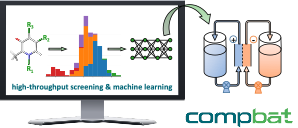The researchers of the CompBat project supported by the EU Horizon 2020 framework program aim at identifying new redox-active organic compounds for next-generation redox flow batteries (RFB). The project endeavours to find safe and environmentally sound solutions for large-scale energy storage, and the Hungarian participants (Theoretical Chemistry Research Group at RCNS, Budapest) are involved in developing high-throughput virtual screening approaches that are based on quantum chemical and machine learning methods. The recently developed molecular database comprising about 6700 pyridoxal-derived molecules with computed redox potentials and the results of the related machine learning analysis provide important guidelines for synthetic developments and electrochemical inverstigations. The CompBat project has reached the interim report period and the collaborating partners are being reviewed by the European Commission in these days.
The large-scale storage of renewable energies remain a significant challenge. Redox flow batteries (RFB) are suitable for this need. In RFBs the energy is stored in the form of electrolytes, which are kept separately in large liquid tanks and pumped into cell stacks, where the redox cycle occurs. However, the majority of previously developed and operating RFBs typically utilize metal-based redox active materials, such as vanadium, which becomes costly and raises environmental issues as well. Using organic redox-active species in these systems, particularly in aqueous environment, is a promising low-cost energy storage approach, which is being explored within CompBat as well.

